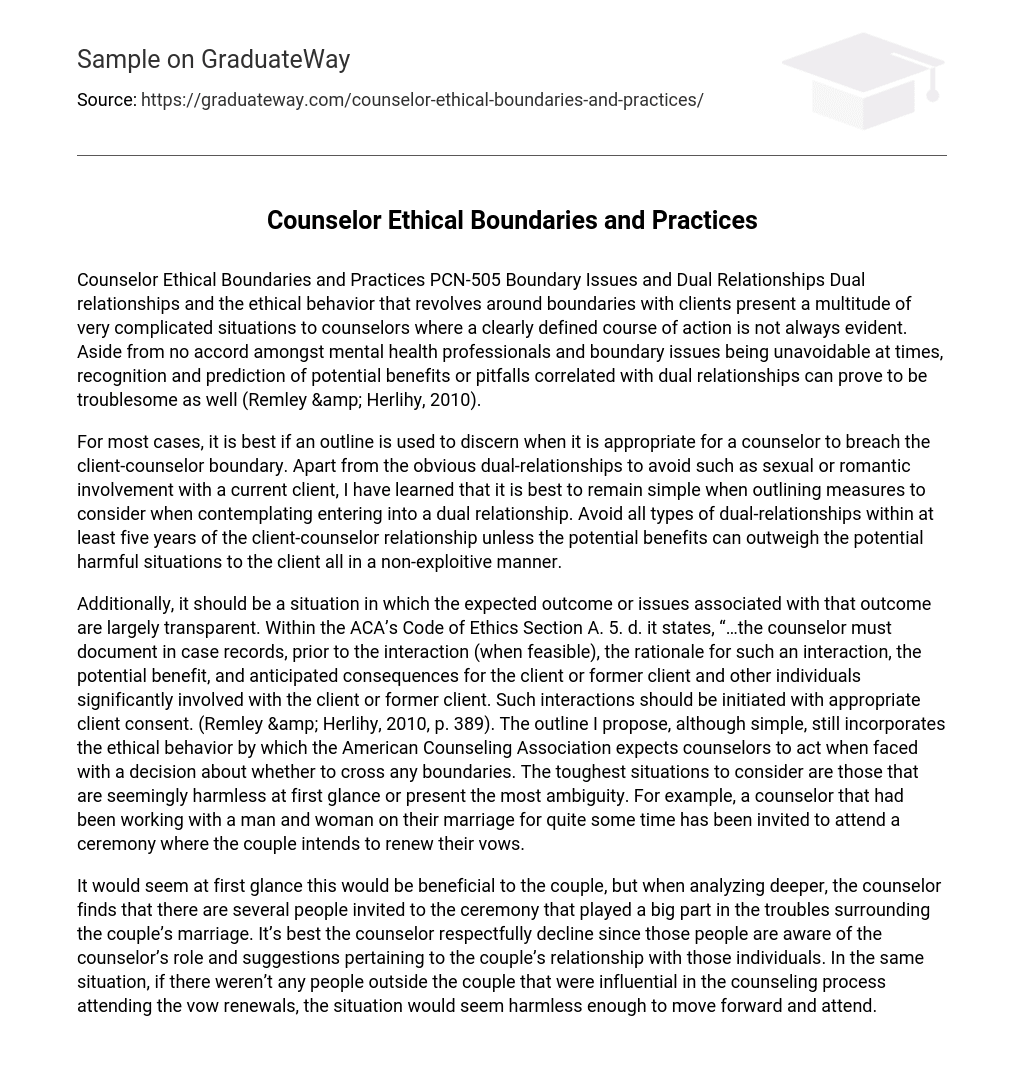The topic of dual relationships and the ethical considerations regarding boundaries with clients creates complex situations for counselors. It is not always clear what the appropriate course of action should be, as mental health professionals have differing opinions on this matter. Additionally, it can be difficult to recognize and anticipate the potential advantages or disadvantages associated with dual relationships (Remley & Herlihy, 2010).
It is generally advisable for counselors to use an outline to determine when it is acceptable to breach the boundary between client and counselor. It is important to avoid obvious dual-relationships, such as any sexual or romantic involvement with a current client. When considering entering into a dual relationship, it is best to keep the outline simple and consider measures to prevent harm to the client, unless the potential benefits outweigh the potential harm and the relationship remains non-exploitative. It is recommended to refrain from all types of dual-relationships for at least five years after the client-counselor relationship has ended.
Additionally, the situation should be one where the expected outcome or issues related to that outcome are clear. According to Section A. 5. d. of the ACA’s Code of Ethics, counselors must record in case files the justification, potential benefit, and possible consequences for the client or former client and other individuals involved. These interactions require proper client consent (Remley & Herlihy, 2010, p. 389). My proposed outline, though simple, still aligns with the ethical behavior expected by the American Counseling Association when counselors face decisions about crossing boundaries. The most challenging situations are often those that initially appear harmless or are ambiguous. For example, a counselor who has been working with a couple to improve their marriage is invited to attend their vow renewal ceremony.
Initially, it may appear beneficial for the couple to have the counselor attend their vow renewal ceremony. However, upon closer analysis, the counselor discovers that several individuals who contributed to the troubles in the couple’s marriage have been invited to the ceremony. Considering that these individuals are aware of the counselor’s role and suggestions regarding the couple’s relationship with them, it would be best for the counselor to respectfully decline attending. If there were no influential people outside the couple involved in the counseling process attending the vow renewals, then it would seem harmless enough for the counselor to join. Let’s imagine a scenario where a counselor is working with a client whose child is also on the soccer team with the counselor’s own child. Occasionally, the counselor would spot their client on the sidelines during games and practices. In one session, the client suggests the idea of carpooling for practices or attending these games together. Several factors need to be taken into account: Has the counseling involved the client’s child?
Has the therapy addressed the involvement of the client’s spouse or ex-spouse, who may also be present at these games or involved in carpooling? Does the client struggle with trust problems? In this circumstance, it appears that there are more potential risks than benefits. During games where both the counselor and client are present, there would be no need to ignore each other; however, taking the relationship any further would not truly benefit the client.
Once the professional relationship ends after a duration of approximately five years or more, there is a potential for a natural friendship to develop. This friendship can be deemed appropriate as long as it does not pose any risks to the client’s well-being and if their children have been on the same sports team during this period. In fact, maintaining contact becomes inevitable when both children are part of the identical team. As this course concludes, I recognize that I have gained valuable insights regarding my own self and ethical behavior in counseling. To my surprise, I have acquired more knowledge than initially anticipated. At the beginning of the class, my understanding of counseling and ethics was limited to being aware that engaging in romantic relationships with clients is prohibited and that keeping their therapy information confidential is crucial.
Throughout my studies, I have gained new perspectives on boundary issues and the rights of clients. I have also discovered important ethical considerations in counseling, such as multicultural awareness and therapeutic neutrality. The discussions on the multicultural environment and the importance of maintaining a neutral stance in therapy were particularly intriguing. I had never fully grasped how a counselor’s values could impact the therapeutic process, especially when they differ greatly from the client’s values. Recognizing that values serve as a foundation for reasoning and can drive change has highlighted the significance of remaining neutral as a counselor. It is crucial to understand that in a counseling relationship, there is an inherent power imbalance that could lead a counselor to impose their values on a client if they are not operating within a value-neutral environment.
Remaining in a state of therapeutic neutrality is essential to maintain an unbiased and impartial environment for therapy. Understanding the significance of therapeutic neutrality is a complex task, requiring continuous exploration and understanding of other individuals and their belief systems. It involves setting aside personal values and being self-aware enough to recognize when it is not possible to do so, and instead refer the client to someone who can provide the best assistance.
After completing this course, I have gained an understanding that the ethical and legal aspects of counseling are highly intricate and do not always have straightforward solutions. In addition to having a strong foundation of morals and values, self-awareness and extensive professional connections are crucial for counselors. When faced with ambiguous situations, seeking multiple perspectives from fellow professionals is often necessary in order to determine the best course of action. However, the most important aspect is a counselor’s own evaluation of themselves. By combining various ethical principles with a genuine assessment of their abilities, values, surroundings, and circumstances, counselors will have the necessary guidance to make appropriate decisions.





